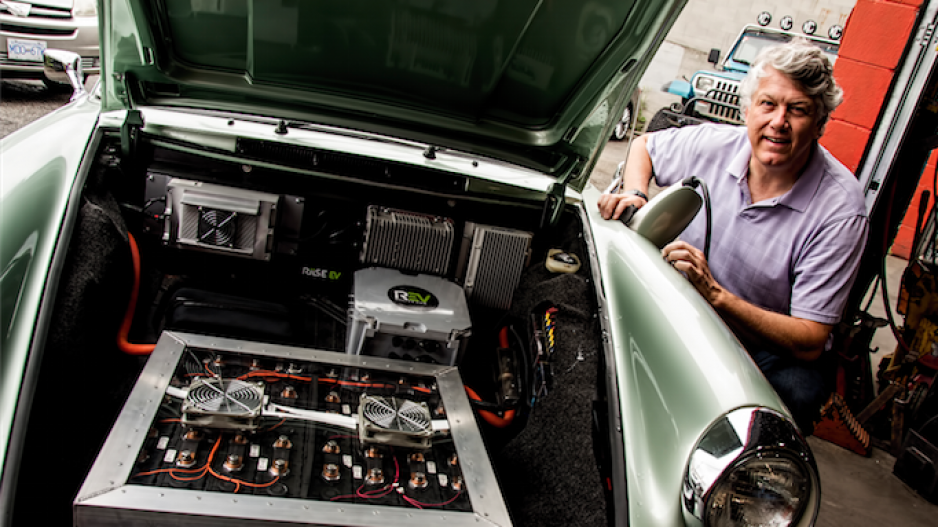As British Columbians were fuelling up with pricey petrol and taking to the roads for August holidays, the province kicked off the month boosting rebates up to $1,000 for zero-emissions vehicles (ZEV). The heightened effort to encourage ZEV purchases comes as both the province and Ottawa have mandated 100 per cent of new passenger vehicle sales to be ZEVs by 2035.
But the future for medium- and heavy-duty vehicles (MHDVs) remains less settled as private industry faces exponentially higher costs transitioning to ZEVs. Rather than investing in new MHDVs, a growing number of B.C. companies are pushing organizations to consider retrofitting fleets to help meet emissions targets.
Delta-based Hydra Energy Corp. specializes in sourcing waste hydrogen from chemical partners to capture the fuel and provide it to commercial semi-truck fleets at below-diesel costs.
The company installs hydrogen-diesel co-combustion conversion kits within a few days and, at no additional cost, installs fuelling stations on site for its commercial customers.
Hydra covers all the up-front costs of converting diesel vehicles to dual-fuel systems, which includes providing the hydrogen fuel tanks, special injection system and fuelling infrastructure.
Hydra’s business model is akin to Software-as-a-Service (SaaS), offering long-term fuel contracts to attract customers who might be reluctant to convert their fleets from diesel to hydrogen because of the costs involved.
The startup has raised $22 million from investors and has signed deals with partners intrigued by the prospect of reducing emissions by up to 40 per cent with retrofitted fleets capable of running on a blend of hydrogen and diesel as far as 1,000 kilometres.
Hydra is partnering with Chemtrade Logistics (TSX:CHE.UN) for its commercial deployment in Prince George.
“We capture it, compress it, clean it up, distribute it to our refuelling station that dispenses hydrogen to 65 trucks,” CEO Jessica Verhagen said.
Hydrogen as low-carbon fuel is most often associated with fuel cell vehicles, which are essentially electric vehicles that generate their own electricity with hydrogen fuel cells. But hydrogen can also be burned, like gasoline or diesel. And because pure hydrogen contains no carbon, it produces no carbon dioxide emissions when burned.
Hydra provides its fleet customers with hydrogen at a fixed price comparable to the cost of diesel. The cost of diesel includes carbon taxes and low carbon fuel standards. Those taxes and standards don’t apply to green hydrogen. Hydra makes its profit on the margin between the price of fully taxed diesel and the price of carbon-tax-free hydrogen.
This year, Ottawa embarked on a new 2030 emissions reduction plan mandating significant cuts in emissions from all industries. While the feds require ZEVs to make up 100 per cent of sales for new passenger vehicles by 2035, industries reliant on MHDVs face significant challenges despite goals less demanding than those for regular consumers.
Instead of an outright mandate, government “will aim to achieve 35 per cent of total MHDV sales being ZEVs by 2030,” according to the 2030 emissions reduction plan. The plan would require 100 per cent of MHDV sales to be ZEVs by 2040 for what it describes as a “subset of vehicles.”
“It’s feasible, but there’s a lot of work to do,” ZEV expert Matthew Klippenstein, a regional manager with the Canadian Hydrogen and Fuel Cell Association, told BIV shortly after the plan was announced.
“Truckers had a really bad experience with the vaunted new technology of 10 years ago: natural gas combustion. It was the trucking industry’s version of the Phoenix payroll system problem in Ottawa.”
Ottawa is offering a $550 million purchase incentive program for MHDVs as well as $200 million for retrofitting large trucks.
“We’ll work with these amounts now, see how far we can get in a couple years and recalibrate as necessary,” Klippenstein said.
Meanwhile in Vancouver, Riise EV Inc. has been retrofitting passenger vehicles – specifically high-end sports cars such as Porsches – with electric engines as it prepares to transition to retrofitting commercial fleets. Costs vary depending on sports cars performance demands, but CEO Dean Kneider said installation of a base kit runs between $50,000 and $60,000.
Kneider met with provincial officials at his Riise EV’s East Vancouver shop in late July to discuss the prospect of converting school buses to electric rather than discarding the diesel models as they get older. Last year, the province began deploying its first batch of electric buses, a total of 18 spread across 13 school districts. The price of each electric bus is approximately $350,000 compared with the average cost of $150,000 for a standard diesel bus, according to the government.
Kneider said it would be more economical to retrofit remaining diesel buses at a cost of around $200,000 each.
“I want to keep our circular economy going. I don’t want to be a throwaway society,” he said. “I’m not opposed to the school bus companies changing their model in time, because they’ve been building gas and diesel buses now for 50 years-plus, so they have the whole supply chain dialled for gas and diesel. They do not have the supply chain dialled for building brand new electric school buses, because they’re doing it differently than the way they would have built a diesel or a gas one.”
– With files from Nelson Bennett




